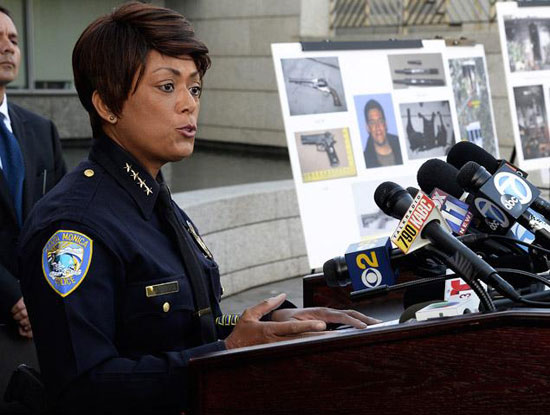Of mental health and guns
July 18, 2013

Santa Monica Police Chief Jacqueline Seabrook discusses the shooting rampage of John Zawahri last month.
By now, the scenario is tragically, infuriatingly familiar; a young man with a history of mental illness unleashes a burst of bullets from a high-capacity weapon, stealing lives and shattering communities in a matter of minutes.
The latest rampage erupted last month in Santa Monica. In a span of just 13 minutes, 23-year-old John Zawahri killed five people—including his father and brother—and terrorized countless others on a shooting spree that ended inside the Santa Monica College library, where police gunned him down.
Zawahri was armed with an assault rifle that authorities suspect may have been assembled from parts bought on the Internet, sidestepping California’s ban on such arms. He also was carrying a .44-caliber handgun and more than 1,300 rounds of ammunition. In the days after the shooting, it was disclosed that Zawahri had been admitted to the psychiatric ward of UCLA Medical Center in 2006 after a teacher at his high school discovered the teenager researching assault weapons online.
The Santa Monica slayings have renewed calls for stricter gun and ammunition controls, both of which I’ve long championed while serving on the Board of Supervisors and on the Los Angeles City Council. But the time is well upon us to also confront serious shortcomings in our mental health system—and in the antiquated attitudes too many of us harbor towards treatment—if we’re ever to succeed in curbing the carnage.
Earlier this week, Rep. Henry A. Waxman convened a forum in Santa Monica on “gun violence, mental health and community recovery.” I was honored to have been asked to participate, alongside an impressive panel of federal, state and local representatives. I was especially encouraged by Rep. Waxman’s announcement that he was pursuing legislation that takes aim not only at loopholes in federal gun laws but also at strengthening, in his words, the nation’s mental health infrastructure.
No doubt, the congressman’s efforts to tighten firearms restrictions will, like earlier measures, meet stiff resistance from lawmakers fearful of the National Rifle Assn. and its backers. But what excuse could there be for not embracing Rep. Waxman’s push to improve access to mental health services and to authorize federally-funded research on serious mental illnesses? No matter what our political affiliations or philosophical bents, who among us has not been touched—personally or through family and friends—by mental health problems of varying degrees, including depression and substance abuse?
The truth is that people with mental illnesses are no more violent than anyone else. Studies have shown that only a small fraction of violent crimes are committed by individuals suffering from serious mental illnesses. But when such a person goes untreated and has easy access to weapons designed to inflict maximum damage, the combination can be combustible, as we’ve seen in shootings from Newtown to Santa Monica.
Los Angeles County’s Department of Mental Health is well aware of the stakes and has worked hard to create and adopt best-practice programs aimed at erasing the stigma of mental health treatment and at encouraging those in distress to seek help. Today, county mental health services are delivered in such community settings as school health centers, primary care clinics and senior centers—places where clients come to believe that their mental health is just another facet of their overall health.
The department, moreover, has initiated a number of innovative public education efforts aimed at front-line organizations and individuals who might encounter people experiencing mental health issues. One of those efforts, which began in May, is called “mental health first aid,” a program that’s been gaining traction nationwide. The goal is simple: to teach people how to recognize the symptoms of mental illness in others, how to illicit information from them in a warm and welcoming conversation and how to guide them towards professional help at an early stage.
Trainers for the mental health department—who received their own training from an organization called Mental Health First Aid USA—have so far conducted three sessions, mostly targeting the faith-based community, where individuals might first confide their struggles. But the benefits of the program extend beyond those being “treated.” Each person who undergoes the two-day county training becomes more sensitive themselves to stereotypes and stigmas surrounding mental health issues. In essence, we’re decentralizing traditional mental health models, enabling a broader, more candid discussion of our emotional well-being.
I know these may sound like small steps. But I also know we’re taking them in the right direction. While we can’t undo a tragedy that’s occurred, we can act now in myriad ways to try to prevent those that have yet to happen. And in that cause, it would seem we can all find common ground.
Posted 7/18/13












 405 bridge work causes a stink
405 bridge work causes a stink





